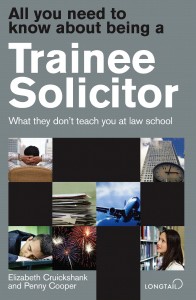Open to Opportunities – By Elizabeth Cruickshank and Penny Cooper
You already know that the aim of a sound training contract is to prepare you for life as a qualified solicitor, by showing you how to put clients at their ease, take sound instructions, translate your legal knowledge into concrete advice for them — and how to go on gaining more legal knowledge. If this on the job learning will be so time and energy intensive, why should you be thinking already of how to get out of the office?
Clients do not always come to you

It’s obvious that you will have to travel to advise criminal law clients who are in prison or held at a police station, but you may also need to leave the office to take instructions from injured clients, frail clients making a will or perhaps corporate clients engaged in an important commercial transaction. Preparation is key.
Make sure that you have the correct papers (and copies), enough pens, paper, cash for taxis and bus fares, a charged mobile phone and even an umbrella — because you don’t want to arrive with a bunch of soggy documents. It is unlikely that you will be sent on your own initially; don’t feel that you are a mere bag carrier. It will be an excellent opportunity to learn how to take instructions and how to elicit information sensitively.
This should of course be blindingly obvious to you by now, and you will probably not be quizzed on any of these situations at interview. However, there are two situations when being asked to leave the office for more protracted periods should be seen as a definite vote of confidence by your firm. At your interview questions about your attitude to being seconded to a client or posted to an office of the firm in another part of the country or even abroad may well come up.
Secondments
In a secondment a firm “lends” a trainee usually to either an important client or to a government or quasi-governmental agency (although in the latter case the secondment is usually of a qualified solicitor of perhaps 3-4 PQE). This has manifold benefits for the firm. The client gets necessary help in a particular area for a defined period of time, possibly because an extra pair of hands in its legal department is required or the secondee is to act as a low level interface between the client and the firm on an important transaction. The benefit to the firm is a more intimate knowledge of the client and the forging of stronger bonds with it – if, and only if, you behave yourself!
The benefits from the trainee’s point of view are more or less similar. You will attain first-hand practical experience of commercial transactions and a greater understanding of the pressures on the client of entering into these transactions. A solicitor’s role is to recognise and sort out a client’s problems; if you have experienced the uncertainties produced when major assets are being sold, a business is being transferred or even the client itself is being sold, you will be in a better position to advise and soothe your clients when you are a qualified solicitor.
Take the time to get to know the personnel at the client office, but don’t concentrate solely on impressing the more senior people. Take every chance to enter into the social life of the client by playing in their sports teams perhaps and make sure that you get to know their employees at your own level. With any luck they will progress as you progress up the ladder in your firm and will be confident in giving you work when they are in a position to do so.
Foreign postings

Not all firms operate from only one office. Many firms operate from several local offices or from a group of national offices or increasingly through architecturally striking offices in global capital cities.
Clearly if you have facility in a relevant foreign language you are more likely to be chosen to be posted to the latter, but even a more rudimentary linguistic knowledge or none at all will not be a disqualification. An ability to speak Chinese is not necessary for a Hong Kong posting although an understanding of Polish would be helpful for a posting to a firm’s Cracow office.
English is increasingly the language of international business, translators are at hand and in most Commonwealth countries, which may have multiple local languages, English is the main “official” language. What is required is flexibility, a willingness to learn about and to accommodate other cultures (remember that British is not always best!) and a desire to cement relationships between the two offices.
Relevance for training contract applications?
Questions about secondments and foreign office postings can come up at interview. If you are asked whether you are interested in either, do not hesitate whatever your private feelings; display interest and willingness. You can always reject the offer if you later decide that you want to work only in Birmingham and not in Newcastle, but you won’t know whether your application has been rejected on those grounds alone if you are dogmatic about your preference at interview.
This is also an occasion when you can demonstrate that you have done your research on the interviewing firm. If the firm has an international oil company client, find out the countries where the client operates and also whether the interviewing firm has offices in those countries. If the firm has an office in Paris, make sure that they have noticed your A Level French. If the firm has an office or a relationship with a firm in a country with a more unlikely language, such as Japanese, then either you have a facility in that language, a great plus point, or you do not, in which case you will be no different from most other potential trainees. Remember that it is the willingness to learn and to be flexible that is valued.
The important thing is NOT to close doors before they are opened to you. Don’t indicate an unwillingness to be posted before you are asked to go elsewhere. Wait until you are invited during your training contract. You will probably be in your second or third seat by then, your personal circumstances may have changed and you will be able to make an informed choice, based on your current position and ambitions and what you have learned from other trainees.
It shows keenness if you ask about secondments and overseas placements, but first make sure that your interviewing firm does offer such things. Your questions should centre around likelihood, about qualities that a trainee should be able to demonstrate and what type of experience would be gleaned. More ambitiously, you should be able to say in a few words how your being out of the office would benefit the firm. Indicate that you expect to work hard, to contribute to the profitability of the foreign office or to foster a good relationship with the client to which you are seconded, NOT that you are off on a jolly, learning more about the night life in Singapore or New York. Simply saying that you are interested in foreign cultures would not be sufficient.
With this in mind you should take every opportunity while you are at Law School to travel purposefully both nationally or internationally, by participating in international Law School exchanges, by representing the University abroad in Law or sporting competitions or even by working abroad not necessarily in the Law. And be prepared to summarise succinctly what you have learned, what contacts you have made and how you survived in a foreign culture.
Thoughts to bear in mind
Although not directly relevant to the interview situation, discretion is the watchword for both secondments and alternative office postings. Many lawyers, accustomed to extracting information from clients, are inveterate gossips, but gossiping about the senior lawyers in your firm to the client and to some extent about the directors of the client to your supervisor may not be a wise move. Many clients and their solicitors have long-standing acquaintanceships and often real friendships going back as far as their schooldays.
Secondment gives you an opportunity to sample life in a different sort of enterprise. If you find it very much to your liking or you find life as a solicitor not to your taste, then building good connections in the seconded organisation may well lead to a more satisfactory alternative career in the future. Someone may remember you and may offer you a job on the back of the excellent work that you carried out while a secondee. And in any event it always looks good on your CV.
Professor Penny Cooper of Kingston University and Elizabeth Cruickshank are the authors of ‘All you need to know about being a Trainee Solicitor’ (Longtail, 2008) and together with Boma Ozobia of “The Survival Manual for New Wigs” (Odade 2010).

